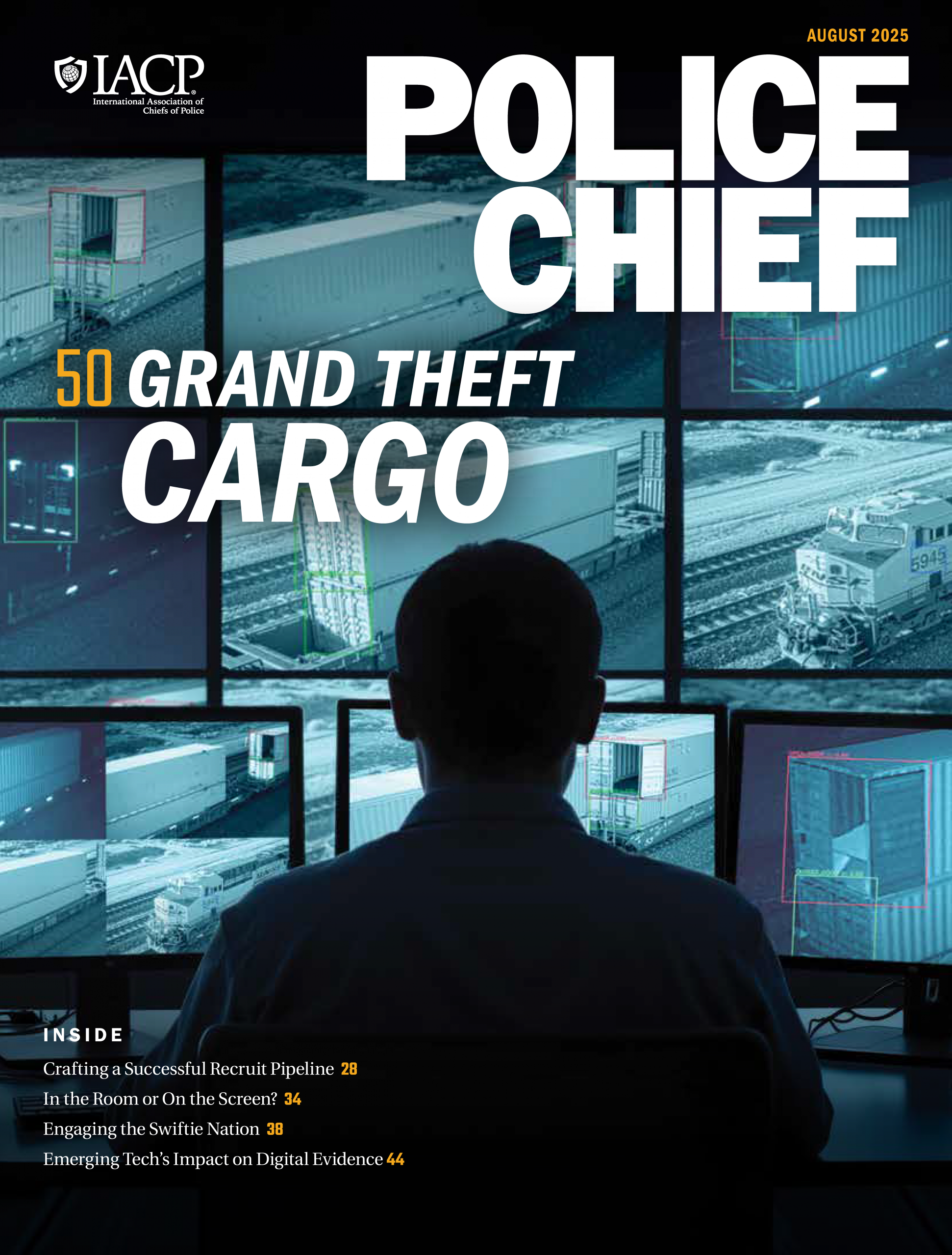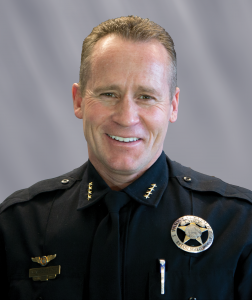
Park City Police Department, Utah
As I complete my term as IACP president, I feel incredibly grateful for all the experiences I have had throughout the year that will stay with me for my lifetime. I first got involved in the IACP because I believe in the mission of shaping the future of the policing profession, and the opportunity to be so deeply involved in furthering that goal has been priceless.
The code of the Old West, close to my heart as a long-time cowboy, includes the directive to “ride for the brand,” which signifies pride, duty, and stewardship for the group you belong to. It has been an honor to serve in this role and ride for the brand, both as a representative of the IACP and the policing profession.
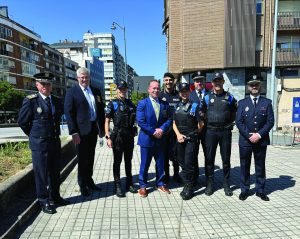 As I was sworn in as IACP president last year, I stated that progress relies on divergent opinions and approaches. I have always believed that a wide variety of perspectives are necessary for strengthening and enhancing a collective mission. While I am grateful to be able to call on my experiences as a 36-year veteran of the policing profession, I also know that there is always value in continuing to seek diverse input to stay knowledgeable on the profession’s challenges and leading practices. That is how we make the IACP and the policing profession stronger—and as president of the IACP I was fortunate enough to be exposed to a variety of geographically diverse police agencies and practices over the course of my presidential term.
As I was sworn in as IACP president last year, I stated that progress relies on divergent opinions and approaches. I have always believed that a wide variety of perspectives are necessary for strengthening and enhancing a collective mission. While I am grateful to be able to call on my experiences as a 36-year veteran of the policing profession, I also know that there is always value in continuing to seek diverse input to stay knowledgeable on the profession’s challenges and leading practices. That is how we make the IACP and the policing profession stronger—and as president of the IACP I was fortunate enough to be exposed to a variety of geographically diverse police agencies and practices over the course of my presidential term.
 As IACP president, I visited many corners of the world, from Australia to Austria. I was able to participate in events with the Australia New Zealand Policing Advisory Agency, INTERPOL, the National Police Chiefs Council of the United Kingdom, the Federal Police of Brazil, the French National Police, the Canadian Association of Chiefs of Police, and the local police of Castilla in Spain, as well as taking part in the World Police Summit in Dubai, the International Forum on Police Cooperation in Taiwan, and the European Police Chiefs Conference, to name a few. I served as a spokesperson for not only the IACP but for the policing community, which I have proudly served for decades. I was able to share resources developed by the IACP and collaborate on shared issues. It is critical to forge and maintain bilateral relationships with all these regions and more. Police across the globe are more similar than we are different, and there is much we can learn from each other.
As IACP president, I visited many corners of the world, from Australia to Austria. I was able to participate in events with the Australia New Zealand Policing Advisory Agency, INTERPOL, the National Police Chiefs Council of the United Kingdom, the Federal Police of Brazil, the French National Police, the Canadian Association of Chiefs of Police, and the local police of Castilla in Spain, as well as taking part in the World Police Summit in Dubai, the International Forum on Police Cooperation in Taiwan, and the European Police Chiefs Conference, to name a few. I served as a spokesperson for not only the IACP but for the policing community, which I have proudly served for decades. I was able to share resources developed by the IACP and collaborate on shared issues. It is critical to forge and maintain bilateral relationships with all these regions and more. Police across the globe are more similar than we are different, and there is much we can learn from each other.
It has been an honor to serve in this role and ride for the brand, both as a representative of IACP and the policing profession.
In the interest of formalizing partnerships with international organizations, the IACP has continued signing memoranda of understanding with other aligned groups. This year, we developed agreements with the Korean National Police Agency, Francopol, the Retail Leaders Industry Association, and the Law Enforcement Torch Run. These agreements help us define key relationships and outline opportunities for collaboration. They represent a commitment to cross-cultural and multidisciplinary approaches to problem solving and cooperation—yet another way to ensure that we are always thinking globally. All my travels led to interactions that were both personally and professionally fulfilling, and I have learned so much as a police leader.
During a trip to Canada, I met with the Toronto Police Service to memorialize their pledge to the IACP’s Trust Building Campaign. With their signing, the agency joined many others in pledging to fulfill the 25 key practices of the campaign within the next 36 months. The initiative covers a variety of topics to strengthen community-police relations, including bias-free policing; use of force; leadership and culture; recruitment, hiring, and retention; victim services; and community relations. Agencies can sign up to join the campaign on the IACP website, which also includes comprehensive resources to aid pledge completion. Even if your agency is already undertaking every practice on the checklist, memorializing these concepts through a campaign submission can provide transparency to your community, which will help build trust. More than 130 agencies have pledged to the campaign thus far, which encompasses more than 250,000 officers. It has been so rewarding for me to continue this effort as IACP president and to continually promote the principles included.
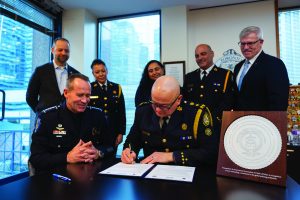
As an association, the IACP has been hard at work, developing resources for the profession and advocating on behalf of police. This year, the IACP set a new membership milestone of more than 34,000 members worldwide. While this is an indicator of the overall strength of the organization, it means so much more than that. It means that we have a vast collective expertise to call upon and inform our decision-making. It means that we are able to provide resources, training opportunities, and critical information to our colleagues across the globe, which is a duty we take seriously. One example of this was with rising civil unrest becoming a more salient issue internationally, the IACP disseminated guidance on crowd control and mass demonstration management. These resources were designed with the objective of keeping our police officers and our communities safe.
Also, in regard to public safety, with more than 1 million firearms stolen over the past five years, the IACP Firearms Committee produced a public service announcement (PSA) titled “Right to Carry, Duty to Secure” to support efforts to encourage safe storage of personal firearms. The short PSA video features basketball legend Shaquille O’Neal promoting the duty of gun owners to secure their firearms. The goal is to encourage safe storage of firearms in homes and particularly vehicles. We encourage all of you to promote this PSA with your local TV and cable stations and on your social media channels as this is a widespread problem. You can also set an example by issuing a gun safe to your recruits when you issue them their firearms, a practice already adopted by some agencies.
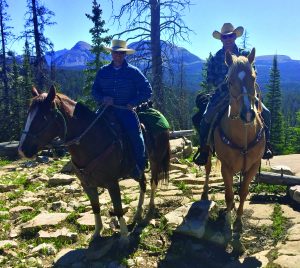
The IACP leadership has been and will continue to remain focused on the future, constantly looking at what we can do to enhance the policing profession. Thanks to the hard work of our leaders and Police Professional Standards, Ethics, and Image Committee, we have published an updated Police Code of Ethics (included in this issue as a resource) to better reflect the responsibilities of police today. Now more than ever, it is critical that we uphold the nobility of this profession, including maintaining the high standards our communities deserve. The Code of Ethics not only reflects a value on the core principles of policing; it also demonstrates a commitment to justice and enhances community-police relationships.
The IACP has also convened a number of task forces to evaluate existing internal programs and procedures, with the intention of increasing access and opportunities for engagement. As IACP president, I had the privilege to appoint skilled and passionate individuals to leadership positions throughout the organization. I highly encourage anyone interested in contributing to the policing profession in a meaningful way to explore engagement opportunities with the IACP. The diverse perspectives we seek must be represented in our leadership, serving as vocal advocates for their communities and for the needs of the profession across the globe.
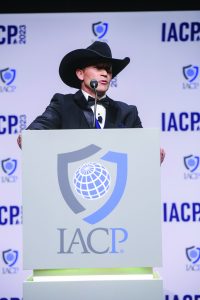 This has been a remarkable year of growth, collaboration, and gratitude. My experiences during this year’s National Police Week in Washington, DC, served as a humbling reminder of why we do what we do as police officers. I will never forget the powerful shared emotions as I, along with my fellow officers, honored the fallen and recognized their sacrifice. I want to thank all of you, the public safety officers serving your communities, for continuing to dedicate yourselves to this distinguished profession. I would like to thank IACP staff, as well as my agency, Park City Police Department command staff, and the City of Park City, Utah, including Mayor Worel, City Manager Dias, and the City Council, for their support every day and especially throughout my presidential term. I also want to extend my gratitude to my fellow IACP Board members, and all volunteer leaders serving on IACP committees, sections, and divisions, who have contributed greatly during my time as president. Your dedication and hard work have inspired me and helped me succeed in my role. Lastly, I want to thank my wife and family for helping me manage my duties not only as a police chief but also as a husband and father. One of the most important lessons I’ve learned through my year as IACP president is the value of relationships, both personal and professional. We can all lift each other up as we safeguard our communities and ride for the brand, together.d
This has been a remarkable year of growth, collaboration, and gratitude. My experiences during this year’s National Police Week in Washington, DC, served as a humbling reminder of why we do what we do as police officers. I will never forget the powerful shared emotions as I, along with my fellow officers, honored the fallen and recognized their sacrifice. I want to thank all of you, the public safety officers serving your communities, for continuing to dedicate yourselves to this distinguished profession. I would like to thank IACP staff, as well as my agency, Park City Police Department command staff, and the City of Park City, Utah, including Mayor Worel, City Manager Dias, and the City Council, for their support every day and especially throughout my presidential term. I also want to extend my gratitude to my fellow IACP Board members, and all volunteer leaders serving on IACP committees, sections, and divisions, who have contributed greatly during my time as president. Your dedication and hard work have inspired me and helped me succeed in my role. Lastly, I want to thank my wife and family for helping me manage my duties not only as a police chief but also as a husband and father. One of the most important lessons I’ve learned through my year as IACP president is the value of relationships, both personal and professional. We can all lift each other up as we safeguard our communities and ride for the brand, together.d


